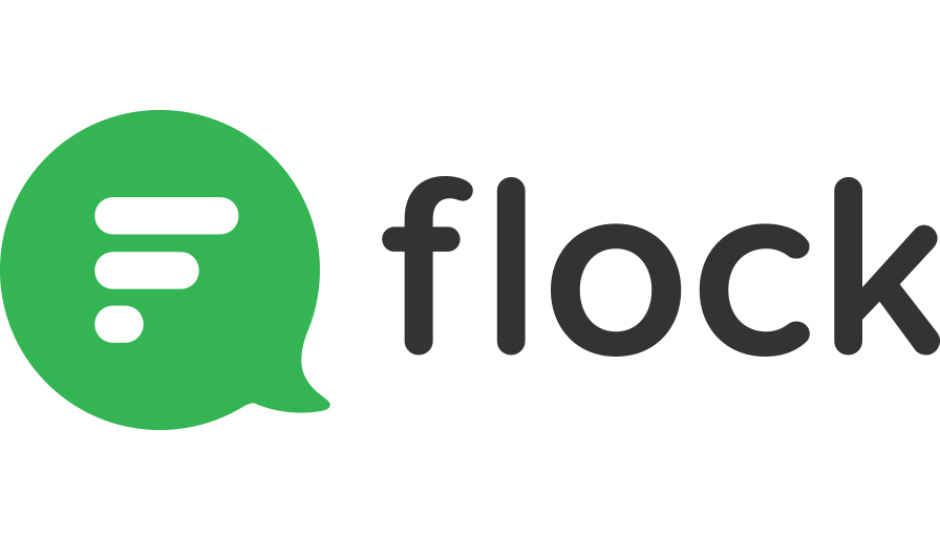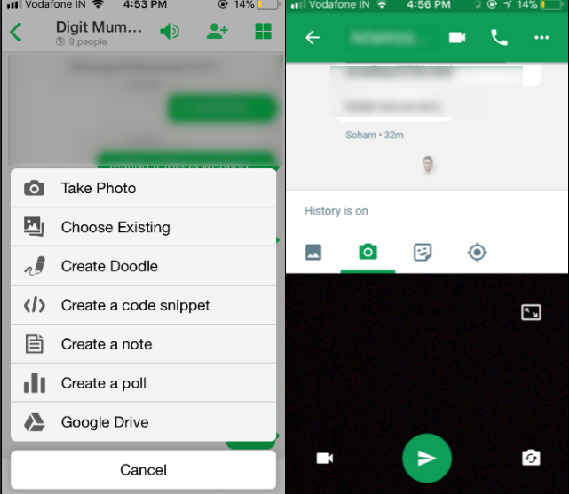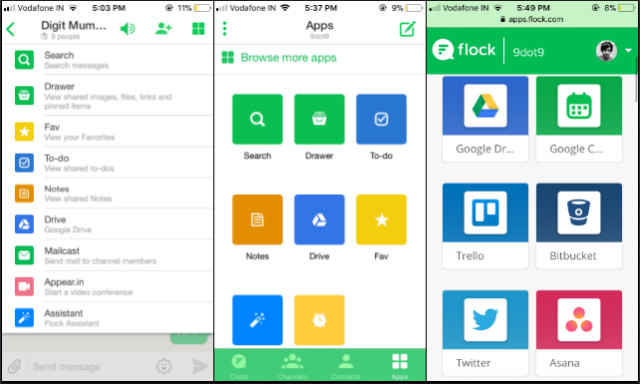Here’s how Flock aims to break habit and bring versatility to in-office communication
With exhaustive third party app support and oodles of flexibility, Flock has a lot of neat optimisations to offer. But, it has strong, established challengers to fend off in process.

Office communication suites play a significantly more important role nowadays. With more companies being spread across a variety of regions across the globe, the need for a robust communication system has grown manifold. More organisations are switching to complete communication suites, complete with peripheral features and add-on services, to enhance mobility and ease at work, and it is this very space that Flock is targeting.
 Survey
SurveyFounded by Indian entrepreneur Bhavin Turakhia, Flock aims to bring together the ease of messaging, managing multiple groups and sub-groups of colleagues, sorting on basis of priority, and adding further tools to enhance fluidity. Alongside, it adds a further host of third party applications to enhance work collaborations from within one window. Simultaneously, the messaging service integrates its own web-based operating system within its services, and that provides great flexibility for teams to customise services to their own needs.
Messaging and Peripheral tools
The key service, though, still remains messaging. With Flock, signing up only requires you to put in your email address, to ensure seamless synchronisation with your entire office team. In what is a really neat feature, if your colleagues have already signed up on Flock and formed a group, you will be automatically added to the group, and the office contacts will be synchronised to your account as well. While other office communication suites like Hangouts do offer automatic scrolling of office-based email addresses, the automatic addition of new joinings to the office group is a neat feature.
The second element that eases usage of Flock is customisability of groups. You can have a global announcements group for your office, which broadcasts common messages for everyone in an organisation. You can then have regional channels, for each location, and further sub-divided groups. For instance, we at Digit have an ‘Announcements’ tab that includes all of my colleagues from New Delhi, Bengaluru, Mumbai and Perth, and separate groups based on location and department like ‘Digit Edit’ and ‘Digit Mumbai’, along with further sub-divisions such as ‘Digit Mumbai_Design’, ‘Digit Mumbai_Edit’, ‘Digit Mumbai_Print’, etc.
Peripheral chat tools: Flock (left), Hangouts (right)
While all of these can be done in any other messaging service, what Flock does is automatically scroll the group emailing addresses within an organisation to seamlessly create such groups. It may be small convenience, but the end result is quite effective when new members join an organisation. Here, each new member is automatically added to relevant groups as and when he/she joins. For instance, if a new employee joins our organisation’s Edit team and is based in Mumbai, she will automatically be added to ‘Announcements’, ‘Digit Mumbai’ and ‘Digit Mumbai_Edit’. This makes the entire office communication seamless, and does not require human effort in adding people individually. This can be particularly beneficial for large companies with multiple office in different locations.
Adding to these are peripheral tools to aid communication within employees. The default set of tools within any chat window include photos, doodles (for visual description or inscribing in photos), code snippets (for quick troubleshooting of websites), notes (that can be pinned like sticky notes and also be marked as ‘pending’, ‘overdue’ or ‘done’) and polls (for selecting a preferred opinion on a particular topic like choosing headlines or deciding on themes for a story campaign). These add versatility to chat windows for both group and individual chats, and is presented in a familiar graphical interface which is aimed at those not very well versed with technology.
Third party app support and FlockOS
Looking beyond the seamless addition of new members and more tools for everyday usage, the third element that impresses about Flock is the exhaustive third party application support. This is pretty much the biggest selling point for Flock, and one that sets it apart.
Breaking it down, Flock integrates its custom web-based operating system – FlockOS. Developed in-house, the idea is to provide a platform for in-office teams to develop and integrate a wide range of third party applications. These function in two ways – one, the universally available third party apps that are added by the Flock team depending on demand from its users, and the two, the ability for organisations to add their self-developed applications to be integrated in Flock.
FlockOS' third party app support
The universally available third party applications include a host of popular apps that are available and are popularly used by many across the world. These include Google Drive (the entire suite), Google Analytics, Hangouts, Twitter, Visual Studio, Pingdom, Giphy, IFTTT, Uber, Wunderlist and more. The idea is for you to never have to leave the chat windows, which is also what makes Flock more versatile. For instance, you can simply draw in website analytics and post it in a group as requested by colleagues, add work snippets from Visual Studio, share travel documents for reimbursement and book taxis via Uber, and even add entries from your personal Wunderlist account.
One big advantage here is for those who work over Cloud via Google Drive. You can seamlessly share Docs, Sheets and more with custom permission levels, which is something that even Google’s own Hangouts does not offer. Simultaneously, most offices use a separate portal for filing reimbursements, where an employee has to raise a reimbursement request and separately file printed copies to claim their amounts. Here, one can simply add PDFs to Drive, and share additional travel receipts. Each of such claims can be pinned, marked in terms of priority and status of completion, and also be retrieved from within a single chat window.
All of this is enabled by FlockOS, which provides a platform for in-house developers to add their own apps to the Store, as required. This format will make the particular app available only to those within the organisation, and not universally. For instance, if your office uses a custom calendar system for keeping track of events, you can add it to the Store and simultaneously use it from within Flock’s chat windows. This does not require any interference or approval from Flock’s end, and can be done by any office place as per their requirement. It is this that makes FlockOS a vital addition, and adds more versatility to office communication.
"Slack is not the competition"
All of these naturally bring forth a direct comparison with one of the most popular in-office communication tools – Slack. Founder Bhavin Turakhia, however, states clearly that for Flock, Slack is not the competition. He sees the in-office communication space as a largely untapped space where exhaustive emphasis is not put, and that is what Flock intends to do. A SpiceWorks survey recently pegged Slack’s market share to just below Microsoft’s Skype for Business and Google’s Hangouts, two in-office suites that enjoy the benefit as most workplaces also use the entire Microsoft and Google ecosystems.
"Third party application ecosystem is possibly its strongest bet"
Despite newer, promising players in this market like Microsoft Teams and Workplace by Facebook, Flock still expects to seize market share by focusing on the still-rising startup culture in developing markets. The third party application ecosystem is possibly its strongest bet, followed by the graphical system of adding features. For instance, where Slack uses a command-line interface for enabling additional tools and features, Flock brings all of the features into easily clickable icons. This is aimed to make the service more affable, and is a step forward to realise that not everyone in an organisation may be absolutely comfortable with a more tech-laden approach to simple everyday tasks.
The way forward
While Slack might not be the competition, the biggest roadblock for Flock may just be the resistance towards change for many. New companies, despite being new, would possibly be used to certain applications (like WhatsApp and Skype), and would hence tend to go for such tools when setting up. Some offices are still smaller in size, and often make do with personal messaging services like WhatsApp even for in-office communication. Flock, in this space, falls in a cross-current where the larger organisations are almost always used to a certain in-office communication interface, and the smaller ones may find adopting a new chat interface more cumbersome than not.
Nevertheless, the truly impressive third party app support is what may encourage many startups, who often work on their own applications, to adopt it. It is this, and the seamless addition and division of groups, that Flock will look to leverage, going forward.

